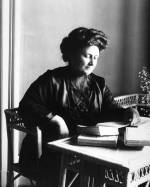Maria Tecla Artemesia Montessori (August 31, 1870 – May 6, 1952) was an Italian physician and educator, a noted humanitarian and devout Roman Catholic best known for the philosophy of education that bears her name, and her writing on scientific pedagogy. Her educational method is in use today in public and private schools throughout the world.
Working class (or lower class, labouring class, sometimes proletariat) is a term used in the social sciences and in ordinary conversation to describe those employed in lower tier jobs (as measured by skill, education and lower incomes), often extending to those in unemployment or otherwise possessing below-average incomes. Working classes are mainly found in industrialized economies and in urban areas of non-industrialized economies.
In Marxist theory and socialist literature, working class is often used synonymously with the term proletariat, and includes all those who expend either mental or physical labor to produce economic value, or wealth in non-academic terms. It thus includes both lower-class workers and middle class workers, including knowledge workers and white collar workers who work for a salary.[1] This definition differs from the non-academic or popular culture conception, because it excludes the extremely poor and unemployed, which are called the lumpenproletariat.
As with many terms describing social class, working class is defined and used in many different ways. When used non-academically, it typically refers to a section of society dependent on physical labor, especially when compensated with an hourly wage. Its use in academic discourse is contentious, especially following the decline of manual labor in postindustrial societies.
The term is usually contrasted with the upper class and middle class, in general terms of access to economic resources, education, cultural interests, and other goods and services. The cut-off between working class and middle class is more specifically where a population spends money primarily as a lifestyle rather than for sustenance (for example, on fashion versus merely nutrition and shelter). Problematically, relying on this method of distinction would rule out many of the people who are often identified as working class.
Its usage can alternately be derogatory, or can express a sense of pride in those who self-identify as working class.


























